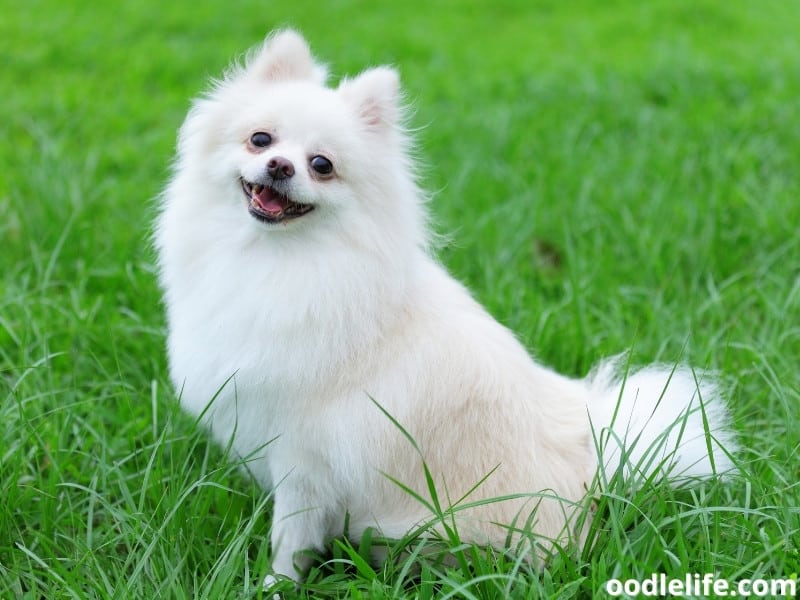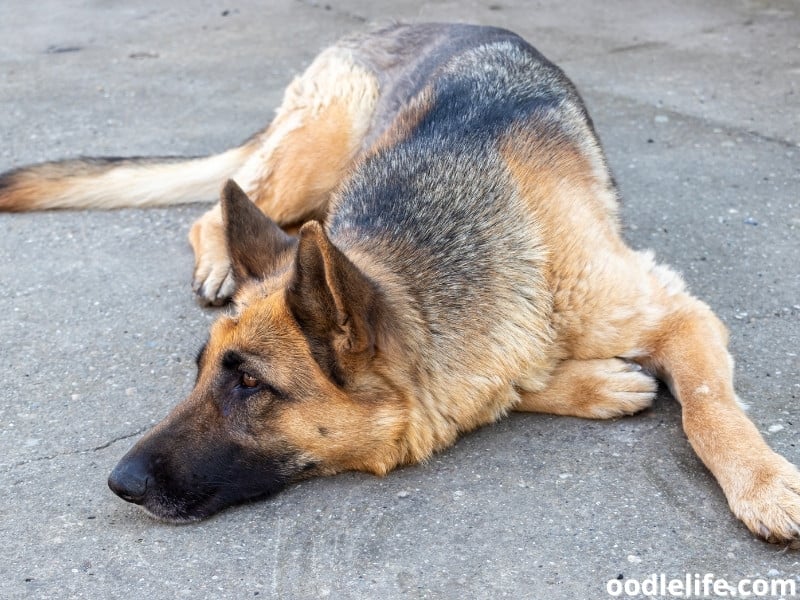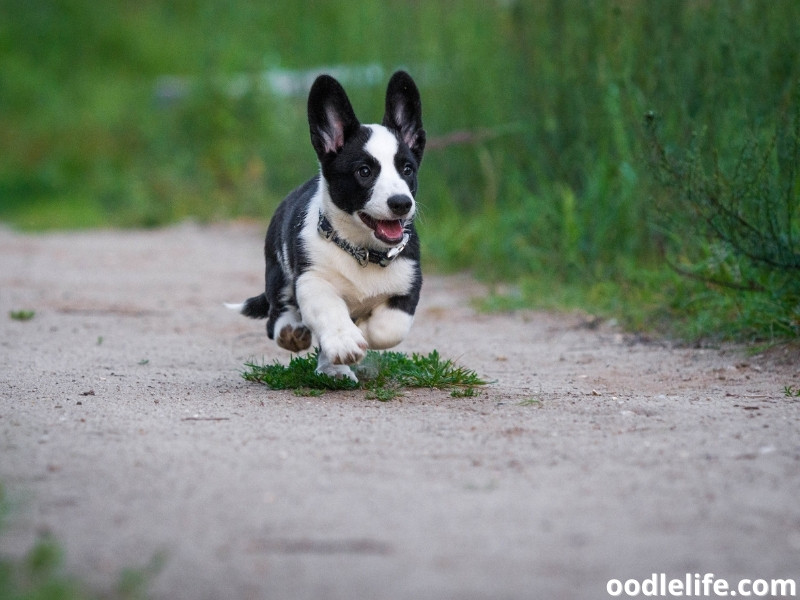Your Dog Is Testing You
Even the most loving and loyal dogs can sometimes test the boundaries with their owners. So, if your indoor dog suddenly doesn’t want to come inside, it could be because they’re trying your abilities as the alpha in the pack.
Dogs aren’t inherently bossy, a trait that humans project onto them in situations such as a dog not wanting to come inside.
Instead, they’re doing as nature wired them, determining where they fall in the pack. So, if you rule out all other possibilities on this list, I recommend hiring a trainer and using positive reinforcement techniques to show your dog you mean business when you ask them to come inside.

Dogs that have territorial and watchdog properties in their blood may not want to come inside. Instead, these dogs feel it’s their canine duty to remain outdoors, protecting you and your home from intruders.
Dog breeds that have a natural affinity for living outside include:
Although these dogs can withstand more extreme weather than certain other dog breeds, it doesn’t mean you should let them sit out a thunderstorm or be in freezing weather.

If your couch potato dog suddenly begs to go outside and doesn’t want to come back in, there could be a medical issue at play. Such issues are usually the result of one of the following conditions:
The common theme with these health issues is that your dog will feel the urge to vomit, pee, or have diarrhea. And being the well-trained pet they are, they don’t want to do this in the house.
One of the best ways to determine the cause of the issue is by analyzing your dog’s pee or poop. Do you see parasites in their fresh poop? Does their urine have a strong odor or a cloudy appearance?
An upset stomach or diarrhea can be harder to determine the cause of. Regardless of the root reason for the medical issue, it’s always best to bring your dog to the vet. The good news is that it’s easy to treat most medical problems that cause a dog to want to stay outside.

There Are Animals To Chase
If your dog doesn’t want to come inside and they’ve got their nose to the ground or are darting their head all over the place, they could be looking for an animal.
Dogs have a 10,000 to 100,000 times better sense of smell than humans. That means what simply smells like a lovely spring day to you can smell like a host of animals that passed through your yard the night before.
It might not take a good sniffer to determine the culprit for your dog wanting to stay outside, though. A glance in the direction of where your dog is looking could reveal a squirrel, rabbit, or another critter.

Critter Season
Let’s face it, every backyard has a critter or two lurking in the grass. However, when spring arrives, there’s definitely more buzzing going around!
Another possibility is that it can sense the presence of another animal, let’s say a skunk. This smell is new to your dog, so it’s probably going to want to find the source.
As I said, dogs are naturally curious, so it’s normal for your pup to want to investigate every sound and smell.
My Dog Hates Going Outside 2020 | Understand WHY!
One reason why dogs always wants to go outside is because the outdoors is teeming with attractions. For sake of an example, its as if dogs are kids overlooking the gates of Disney and wanting to enter that magical world. Unlike humans, staying indoors doesnt offer much entertainment to most dogs, especially the active breeds. However, if your dog is suddenly wanting to go outside all the time to potty, it may be time to schedule a vet appointment, as there may be something medical going on.
Many dogs always want to go outside and this can be frustrating for dog owners who keep on getting up escorting their dogs out the yard. Whats up with these dogs?
Well, if we start looking at the world from our dogs perspective, there may be many reasons as to why dogs always want out.
Of course, ruling out medical problems is paramount considering that there are several health conditions in dogs that may trigger more outdoor trips.
When dogs engage in certain odd or unusual behaviors, its always a good idea ruling out medical problems. For instance, a dog who may be asking to go outside frequently, may be suffering from a urinary tract infection.
Urinary tract infections cause dogs to feel compelled to go potty very frequently. Often, once out, they will squat and produce only a few drops of urine at a time.
Female dogs are commonly affected. Affected dogs may also lick their private areas often and may have blood in their urine. Other urinary problems that may cause increased trips outdoors are the presence of crystals or stones in the urine.
On the other other hand, dogs may also ask to go outside frequently due to the presence of diarrhea. Colitis is a common cause of diarrhea in dogs. When affected by colitis, dogs tend to have a sense of urgency and more frequent bowel movements which often contain fresh red blood and mucus. Dogs with colitis may also be seen straining and producing just a few drops of diarrhea.
And then there are other medical problems not associated with urinary or digestive problems. For instance, dogs who feel hot such as dogs suffering from a fever, may be restless and may seek cooler outside temperatures. The normal temperature range for dogs is 99.5 to 102.5.
Older dogs may seek the outside if its cooler as they age because they may no longer be able to cool down as well as they did when younger. Age-associated conditions such as painful arthritis or conditions that cause trouble breathing (such a laryngeal paralysis) may also cause dogs to seek cool areas or cool surfaces to lie down.
Cushings disease is also a condition that may cause in dogs the inability to cope with hot temperatures.
Many dogs whine and act restless asking to go outside because they detect the presence of critters. Dogs have a powerful sense of smell and they can hear things that our ears cannot detect.
If your dog is sniffing the air and pacing, there are chances he caught a whiff of some critter from your air conditioning vents or heating vents or perhaps from the air currents coming through windows or under doors.
Of perhaps your dogs powerful ears detected some noise that is intriguing him. Interestingly, dogs are capable of hearing very subtle sounds such as mice scratching in walls. Did you know dogs can hear lower frequencies than humans?
Regardless of whether your dog is smelling some critter or hearing some distinct sounds, your dog is on a mission to hunt down this pesky intruder.
Despite being fed from shiny bowls and wearing fancy collars, dogs remain hunters at heart. Your dog may be therefore asking to go out to inspect the source of the smells or sounds that intrigue him and he may do so in a very demanding way that is difficult to ignore.
Not all dogs though are drawn to critters at the same level. Some dogs more than others are equipped with higher drives to hunt down animals.
For instance, small terriers (such as Jack Russell terriers, Yorkshire terriers, Cairn terriers) are notorious for wanting to chase after small animals such as mice. And who can blame them? Many of these dogs have a history of being selectively bred to kill rats or other small critters. Read more on this here: Introducing the ratter!
Food for thought: Is there a new dog in your neighborhood or perhaps a cat in the yard? If so, your dog may want to go outside just to learn more about them. Make sure though your dog doesnt harm any visiting cats or kittens!
Teaching bite inhibition in puppies is an important skill to learn because it can ultimately play a big role in preventing injury to humans and other animals. Discover how dogs master it and how you can help.
Yes, dogs can have love handles, just as in humans, but they are called quite differently. Discover where your dogs love handles are located and what you should do if your dog has them.
Many dogs associate the great outdoors with reinforcement. In other words, the outdoors offers them activities and access to stimuli that feel very gratifying to them.
Unlike humans who may enjoy indoor activities such as watching T.V, crocheting in front of the fire or social networking, dogs have very little to enjoy when confined between four walls, unless dog owners offer them things to do.
The outdoors instead offers an ever-changing kaleidoscope of smells. Heres a fact: smell is never the same from a dogs perspective. Every time you take your dog out, there is a change in scenery with new scents that your dog never grows tired of exploring.
As visual beings, this may be difficult for us humans to completely comprehend as we mainly use our eyes to scan the world, while dogs focus on detecting scents and interpreting clouds of odorous particles coming from every direction.
As Alexandra Horowitz puts it, goes a long way. In her book “Being a Dog, Following the Dog Into a World of Smell” she claims: “Each departure from the house brings a new scene, one never visited. Each day, each hour, wears a new smellscape. There is no such thing as “fresh air” to a dog. Air is rich: an olfactory tangle that the dog’s nose will diligently unknot.”
On top of smells, dogs may also be attracted to the outdoors because they get to stretch their legs and move around. Dogs, being cursorial animals, are known to enjoy walking and romping around and staying in the home doesnt allow much of that.
Some dogs are also prone to wanting to patrol their properties and investigate everything on a random basis. If your dog is prone to barking at cars, people, dogs or animals who approach the fence line, he may be asking to go out every time he hears something.
This can be perceived as a reinforcing activity to dogs (especially bored, under-stimulated dogs) as they interpret their barking as the reason why people, cars and other dogs or animals move away from their properties. These dogs will therefore fall into the habit of wanting to repeat the barking behavior over and over to just send “the intruders” away.
Some dogs like to patrol their properties several times a day and urine mark. Urine marking in dogs is not peeing for the mere purpose of the emptying the bladder, its peeing with a purpose and that purpose is leaving scent around.
Traditionally, when dogs urine mark, they will engage in what is known as a “raised leg display” where they will balance themselves on three legs while raising the fourth leg and aiming the stream of urine on vertical objects. Intrigued about this? Discover 12 peeing positions in dogs.
In particular, intact female dogs (not spayed) may want to repeatedly go outside to urine mark when they are in heat. Their urine is rich in pheromones which informs male dogs about their reproductive status. Male dogs may smell this scent from quite a distance and may ask to be taken out repeatedly as well.